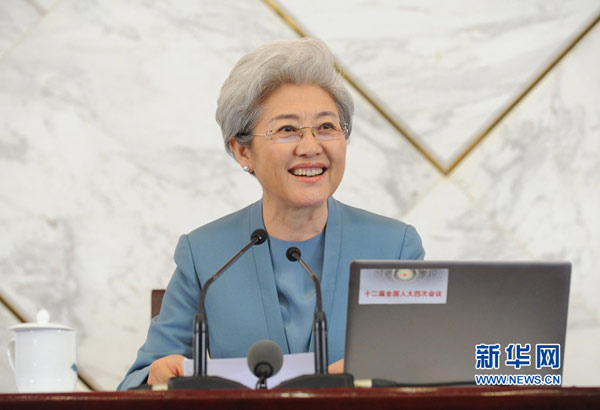 |
|
Fu Ying, spokesperson for the fourth session of China's 12th National People's Congress (NPC), answers questions during a press conference on the session at the Great Hall of the People in Beijing on Friday. The fourth session of the 12th NPC is scheduled to open on Saturday. [Photo/Xinhua] |
Fu Ying, spokesperson for the fourth session of the 12th National People's Congress, answered questions from reporters both Chinese and foreign at a press conference on Friday, one day before the top legislature starts its 2016 session. Here are some of the highlights. About Fu Ying
About two-child policy
China's new population policy, which took effect nationwide on January 1, is timely and proper and the government will address the country's aging problem, said Fu.
South China Sea
It is United States that is militarizing the South China Sea, said Fu Ying.
She said that currently most of the advanced aircraft and warships passing through the South China Sea belong to the United States.
According to its strategy of pivot to Asia-Pacific, the United States has decided to deploy a larger part of its naval force to this region, and is also strengthening military presence in the Asia Pacific region with its allies, said Fu.
Most of Chinese lawmakers and ordinary people are not pleased and do not agree with the US showing off its military power by sending warships to waters close to the South China Sea islands and reefs.
The United States said it did not take sides in the South China Sea disputes, however, its acts and rhetoric make people feel that it is raising tensions in the region, Fu said.
Wrongly accusing China's militarization in the waters is a hegemonic act in language, which will also mislead the situation, said Fu.
Military spending
China will raise its defense budget by around 7 to 8 percent this year, compared with an increase of 10.1 percent last year.
The increase is in line with China's national defense need and fiscal revenue, said Fu Ying.
About overseas NGOs
A new bill to regulate overseas non-governmental organizations (NGOs) in China, yet to be finalized, is not aimed at restricting them but at providing a better legal environment, said Fu.
The bill has been read twice by the Standing Committee of the National People's Congress and is still being amended, and lawmakers have extensively solicited opinions and suggestions from both within and outside China.
The Ministry of Public Security (MPS) is in charge of drafting the bill as it is a tradition that the MPS handles foreigners' activities in China, such as visa application and residence registration.
Philanthropy
"China has long tradition of helping the unprivileged. Chinese people are getting rich and many people and companies are willing to donate a part of their wealth to help people in need," Fu said.
The amount of donation by social entities and individuals in 2014 reached 100 billion yuan ($15 billion), a big rise from the 10 billion yuan in 2004.
Philanthropy is developing fast in China and the nation aims to standardize it through a charity law.